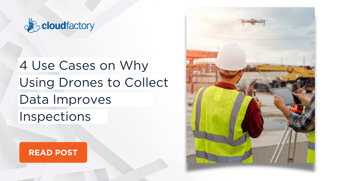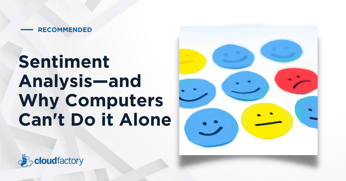The AI Summit uncovered the potential of generative AI, with a spotlight on ethical AI, benefits to creatives, and the critical role of humans in the loop.
CloudFactory Blog

Experience "Christmas in July" with a ChristmasGAN project. Explore Generative Adversarial Networks, image translation, and creative Christmas touches.

Uncover CVPR 2023 top takeaways, including new roles for humans in the loop, self-supervised learning and zero-shot models, and humans in generative AI.

Discover how drone inspections enhance industrial processes, improving safety, efficiency, and data accuracy. Learn about power lines, pipelines, and more.

Discover how insurers use AI to reduce insurance customer acquisition cost, boost efficiency, and improve engagement across the policyholder journey.

No time for a webinar? This blog post recaps our discussion on ethically designed AI systems with the 4 steps you need to achieve ethical AI.
.png?width=346&height=181&name=Blog%20CTA%20Design%203%20(3).png)
Are you ethically sourcing training data for your AI models? And what does “ethically sourcing” mean, anyway? Read this post to explore the issue.

These four use cases examine why using drones to collect data makes drone inspections safer, more accurate, and more efficient than manual inspections.

The nuances of language can be difficult for a machine to understand, hence the need for human input to accelerate testing and ensure quality control.

Sentiment analysis can turn the abundance of online information into actionable insights, but machines can’t do everything by themselves.

Humans are necessary while automating decisions and processes with AI, machine learning, and RPA. Experts discuss the need for humans in the loop (HITL).
-2.png?width=346&height=181&name=Blog%20Social%20Graphics%20(Resizing)-2.png)
No matter how robust your initial training may be, keeping your machine learning models up-to-date is essential. Here are two retraining approaches.
-Nov-23-2020-09-20-54-08-PM.png?width=346&height=181&name=Image%20Resizing%20for%20Blog%20and%20Social%20(2)-Nov-23-2020-09-20-54-08-PM.png)
AI is only as good as the data it's trained to analyze. CloudFactory CEO Mark Sears shares in Forbes about how AI bias can arise from people, tools, algorithms, and human ...
-3.png?width=346&height=181&name=Image%20Resizing%20for%20Blog%20and%20Social%20(7)-3.png)
When humans and computers work together we can do incredible things. Human-in-the-loop computer vision can help solve problems that are hard for even humans to do themselves.
.png?width=1563&height=1563&name=Untitled%20design%20(38).png)




.png?width=1563&height=1563&name=Untitled%20design%20(30).png)



.png?width=1563&height=1563&name=Untitled%20design%20(33).png)


.png?width=1563&height=1563&name=Untitled%20design%20(34).png)







